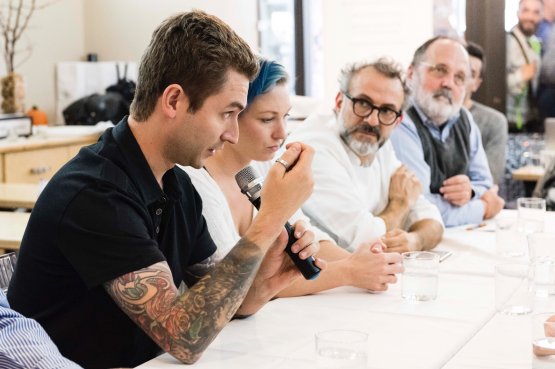It’s becoming a classic event within Identità New York. The content is growing more and more interesting, thanks to important speakers who convey their experience straight from the kitchen. This year Francesco Genuardi, Italy’s general consul in New York also participated, stressing the institutions’ growing interest in our industry.
The debate was organised by S.Pellegrino and titled “Talent and the mentorship, a mutual opportunity”, a good point of view to analyse a crucial mechanism of the S.Pellegrino Young Chef (the finals of the second edition will be held in Milan from 13th till 15th October) and of the future of the restaurant industry.
Chefs summoned to speak about the master/pupil relationship were sitting next to Clement Vachon, International relations, events & communication manager and David Hardie, director S.Pellegrino Usa. Pavia Rosati, founder of Fathom Away, was moderating in front of an audience of interested American journalists. Here are some of the most interesting things said.
Carlo Cracco, Cracco, Milan: «Being a mentor is complicated, because being a chef is complicated: you’d have to be always present and observe what the pupil is doing, but this is not always possible. My first master was German: he only spoke German and I understood nothing. For us, it is essential that everyone who enters our kitchen feels part of a team, not isolated».

Alex Stupak, Emma Bengtsson, Massimo Bottura, Paolo Marchi
,
Empellon, New York: «I was lucky enough to have some truly great masters:
Grant Achatz in Chicago and
Wyle Dufresne in New York. They always told me the reason behind something, not just how, and this is what I’m trying to do these days. The problem is today young people only want to know what they can do and earn, they’re not humble».
Massimo Bottura,
Osteria Francescana, Modena: «As chefs we must stop speaking, we must start to act. Let’s try to share our ideas around the world, outside the restaurant niche. Sharing is all that counts. This is how we can determine the future of our profession».
Niko Romito,
Casadonna, Castel di Sangro (Abruzzo): «During 4 years of
Niko Romito Formazione, around one hundred students have sat in our classes. ‘Why do you come here?’ we always ask them at the beginning. Almost nobody answers – ‘to learn’ – because their dreams are mostly focused on the media. It’s not nice to say, but 50% of they guys who graduate often lose their way. A mentor’s first responsibility, these days, is making cooks responsible, put them in the right places. And we must take care of young people because it takes years for talent to blossom».
Paolo Marchi,
Identità Golose: «I’d like to mention an anecdote from the third edition of
Identità Milano, in 2007. Scandinavia was the guest nation. At one moment, during his lesson, a chef from Finland was asked: ‘how did you cook the reindeer?’. ‘I can’t answer’, he said, ‘it’s a secret’. This is exactly the approach a chef should not have because if you’re sure of yourself you share, if you’re not, you keep things to yourself. Perhaps
Gualtiero Marchesi was right when he said ‘A chef who keeps his secrets is the kind of chef who only had one intelligent idea'».
Emma Bengtsson,
Aquavit, New York: «I’m trying not to be the holder of the truth in the kitchen. There are young cooks from whom I’ve learnt a lot».